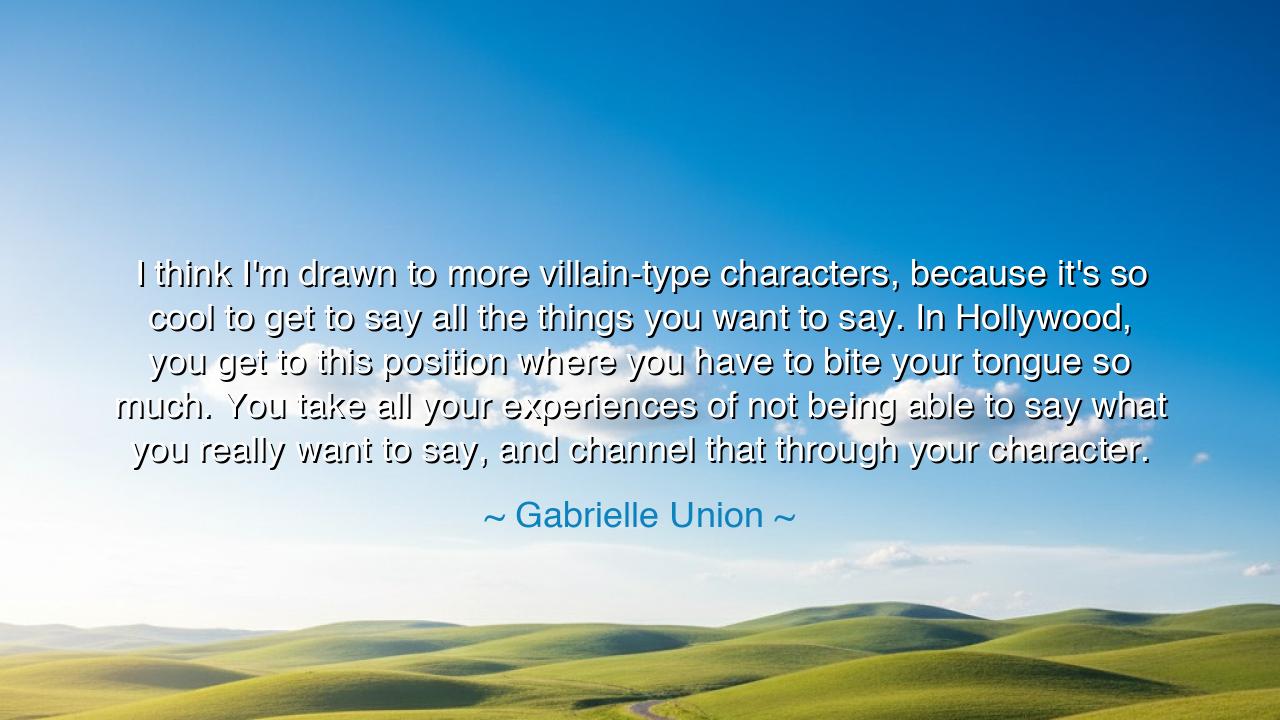
I think I'm drawn to more villain-type characters, because it's
I think I'm drawn to more villain-type characters, because it's so cool to get to say all the things you want to say. In Hollywood, you get to this position where you have to bite your tongue so much. You take all your experiences of not being able to say what you really want to say, and channel that through your character.






“I think I'm drawn to more villain-type characters, because it's so cool to get to say all the things you want to say. In Hollywood, you get to this position where you have to bite your tongue so much. You take all your experiences of not being able to say what you really want to say, and channel that through your character.”
— Gabrielle Union
In this confession of spirit, Gabrielle Union speaks not merely of acting, but of the eternal struggle between truth and restraint, between the fire that burns in the soul and the mask the world demands we wear. Her words are not only about art, but about the human heart—about the power of expression, the ache of silence, and the alchemy that turns pain into creation. In the world she describes, one must often bite one’s tongue, swallowing truth for the sake of peace, politics, or survival. Yet through art, through character, through the daring of the imagination, that which was suppressed can rise again, freed and unbound.
To play the villain is, in truth, to reclaim a forbidden power. For the villain dares to speak, to defy, to unveil what others conceal. They are mirrors of our unspoken selves—the thoughts we bury, the emotions we deny, the truths we fear to voice. In this, Union unveils a paradox of human nature: the soul that appears wicked in art may in truth be honest, while the soul that seems virtuous may simply be silent. By embodying those who stand outside of goodness, the artist speaks truths that the good themselves dare not utter. Thus, the villain becomes not a monster, but a vessel for liberation.
There is an echo of this in the tale of Antigone, the defiant daughter of Thebes. When King Creon forbade the burial of her brother, she refused his decree and spoke the words no woman of her time dared to speak. In her defiance, she was deemed a rebel—a villain to the law—but her voice, unbroken and blazing, became the very sound of conscience. Antigone, like the characters Union speaks of, bore the weight of silenced truth, and in voicing it, she became immortal. So it is in art and in life: the courage to speak one’s truth may make one seem defiant, yet it is the foundation of human dignity.
Union’s reflection carries a lament as ancient as civilization itself—that those who walk among power must often dwell in silence. In Hollywood, as in courts and kingdoms of old, one must guard one’s tongue to survive. The artist, the servant, the soldier, the dreamer—each learns to hide behind the curtain of diplomacy. But within, the words burn like coals, waiting for a place to ignite. The stage, the canvas, the page—all become sanctuaries where repressed truth transforms into art. In this transformation, there is healing. What was once swallowed becomes sung; what was once endured becomes creation.
But let not her words be heard only by actors and poets. For all who live in this world must sometimes silence themselves—to keep peace, to keep employment, to keep love. Yet there lies within each person a quiet rebellion, a longing to speak honestly and live without fear. The lesson, then, is not to destroy restraint, but to find a sacred outlet for it. When you cannot speak, create. When you cannot shout, write. When you cannot strike, build. To channel the unsaid into beauty is the path of the wise and the strong.
Remember this: expression is not indulgence—it is survival. To hold one’s truth too long is to rot from within, but to channel it with grace is to turn poison into power. Union’s words remind us that art is the tongue of the silenced, and that each of us must find our stage, our role, our sacred villainy, where truth may live again. The villain, in this sense, is not evil—but fearless. And the fearless are those who dare to live fully, even when the world bids them quiet.
So, my listener, take this teaching into your days: Speak, even if softly. Create, even if unseen. Transform what you cannot say into something that cannot be ignored. Let your struggles become your script, your silences your song. For in doing so, you too become the artist of your destiny—no longer bound by the world’s restraint, but shaped by the fire of your own truth.






AAdministratorAdministrator
Welcome, honored guests. Please leave a comment, we will respond soon